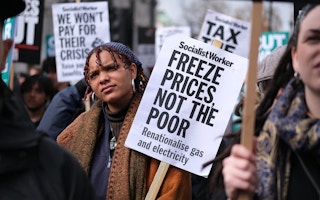The Intergovernmental Panel on Climate Change (IPCC) has issued a final warning to humanity: unless we halve greenhouse-gas (GHG) emissions by 2030, we will have no chance of capping global temperatures at 1.5° Celsius above pre-industrial levels. Achieving that target will be extremely challenging, but it is both possible and affordable – if we ensure that the world’s wealthiest pay their fair share.
Inequality has skyrocketed in recent years. During the pandemic, as more than 160 million people were pushed into poverty, the world’s ten richest people doubled their fortunes. The wealthiest 10 per cent of the global population now rake in 52 per cent of global income and hold 77 per cent of global wealth, while the poorest 50 per cent claim just 8 per cent and 2 per cent, respectively.
The gap continues to widen. Billions of people are suffering from rising living costs and stagnant wages, and with recession looming, prospects for achieving greater prosperity appear bleak. The world has never been so wealthy, yet most people endure chronic economic insecurity. This is a recipe for deeply polarised, dysfunctional societies, democratic decay, and a dangerously unstable world.
Economic inequality is reflected in climate inequality. As the IPCC notes, the 10 per cent of households with the highest per capita emissions – that is, the wealthiest households globally – contribute up to 45 per cent of consumption-based household GHG emissions. The bottom 50 per cent – four billion people, many of whom face severe energy insecurity – contribute just 13-15 per cent.
Here, too, the gap is continuing to widen: the richest 1 per cent – 63 million people earning at least $109,000 per year – are the fastest-growing source of carbon emissions by far. And this is happening at a time when, every month, the world is burning through more than 1 per cent of its remaining carbon budget for limiting global warming to 1.5°C.
“
Economic inequality is reflected in climate inequality.
But the discrepancy in emissions is only part of the story. As the IPCC’s new report highlights, there is overwhelming scientific evidence showing that an equitable approach to climate action, in which the benefits and burdens of the needed transformation are distributed fairly, is vital to build social trust, without which the 2030 target will be all but impossible to meet.
This aligns with our assessment at Earth4All. We predict that, unless concerted action is taken, inequality will continue to grow throughout this century, leading to rising social tensions and unrest – and making it far more difficult to tackle existential crises like climate change.
Concentration of wealth leads to concentration of power, with the wealthiest actors enjoying disproportionate influence over elections and public policy. This undermines trust in democracy, making it more difficult for governments to make long-term decisions that serve the common good. More egalitarian countries tend to have higher levels of trust in government, in addition to better outcomes when it comes to education, health and longevity, obesity, child mortality, crime, and the environment.
As the IPCC report makes clear, averting the worst effects of climate change demands a profound economic transformation in the next decade. But that transformation can succeed only with broad public support, based on a new social contract that ensures a fairer distribution of wealth and income.
Specifically, by 2030, Earth4All proposes that the wealthiest 10 per cent in all countries should be claiming less than 40 per cent of national incomes, with their share remaining on a downward trajectory thereafter. Past experience shows that progressive taxation on both income and wealth for individuals and corporations would be an effective means of achieving this.
This means targeting the assets of the extremely wealthy wherever they are held, including in tax havens, and developing and sharing national registries of assets held in different forms. Governments should also hike taxes on luxury-related consumption that drives GHG emissions, such as the use of private jets.
In addition, we recommend implementing a universal minimum corporate-tax rate that is close to the global average of 25 per cent – far higher than the 15 per cent rate agreed by the G20 in 2021. Multinational corporations should be subject to the same tax rates as domestic companies, with unitary taxation of global profits based on the share of sales, employment, and assets in each country.
We also propose taxing windfall profits in sectors like energy. While the world has confronted an energy crisis driven by the war in Ukraine, fossil-fuel companies should not have been able to pocket hundreds of billions of dollars in profits. Likewise, governments must close international tax loopholes and eliminate outsize subsidies on fossil fuels – now topping one trillion dollars annually – once and for all. The IPCC estimates that removing subsidies could lower GHG emissions by up to 10 per cent by 2030.
More broadly, governments should use progressive taxation to discourage share-buyback schemes. At a time when the world needs innovation to facilitate economic transformation, inflating shareholders’ gains must not come before investment in research and development.
Crucially, whatever additional revenues are generated by progressive wealth and income taxes must be used to protect the most vulnerable groups, support those who are displaced by the green transformation, advance gender equality, and overhaul energy and food systems.
By easing social tensions and improving well-being, progress on inequality would make democracies more stable and resilient, enabling them to respond to shocks more effectively and make rational long-term decisions for the common good, not least with regard to climate change. But, as the IPCC has made clear, time is running out.
Owen Gaffney, Project Lead of Earth4All, is Chief Impact Officer at Nobel Prize Outreach.
© Project Syndicate 1995–2023











